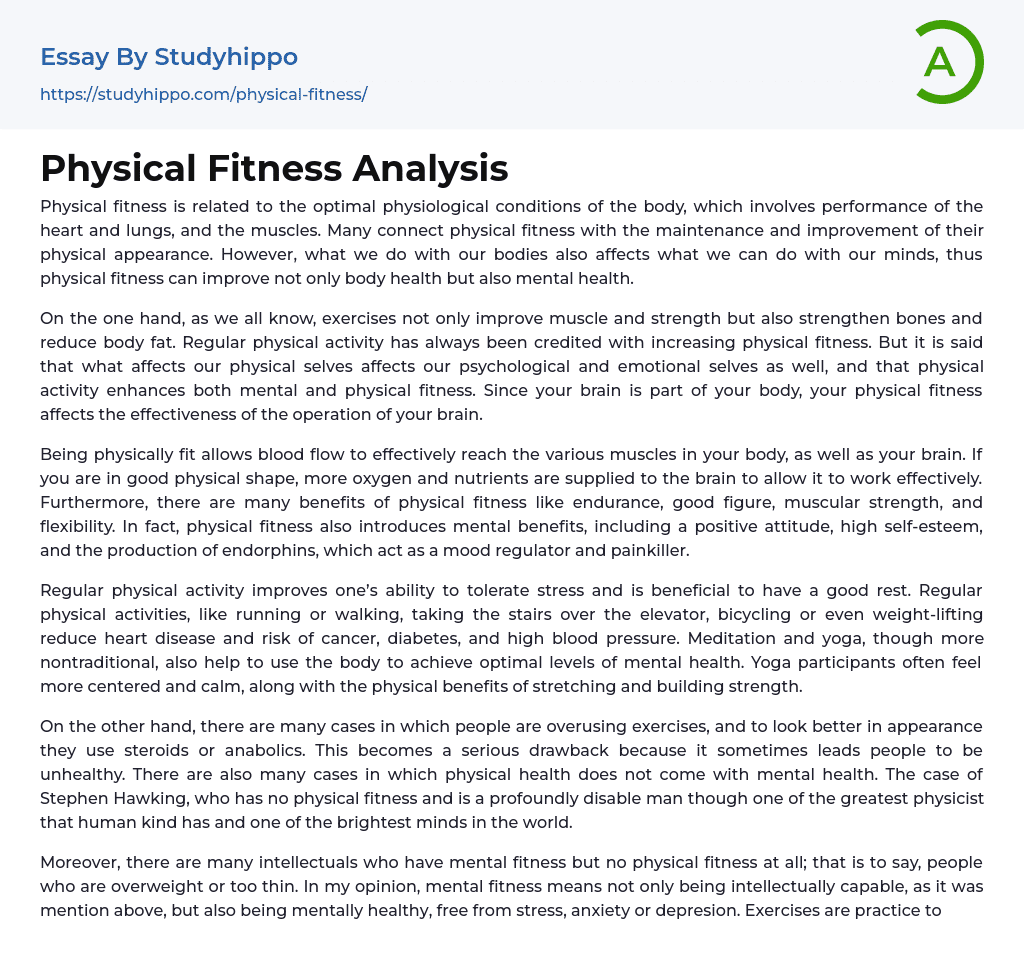Physical fitness refers to the overall physiological state of the body, including heart, lung, and muscle function. While some people associate physical fitness with improving and maintaining a pleasing appearance, it also significantly impacts mental well-being. As a result, physical fitness promotes both physical and mental health.
Exercise has the ability to improve both physical and mental fitness. It not only strengthens muscles, bones, and reduces body fat, but also enhances mental and emotional well-being. Physical fitness directly impacts brain function as it is an essential aspect of the body.
Physical fitness has multiple benefits for both the muscles and brain. It improves blood flow, leading to enhanced brain function through increased oxygen and nutrient supply. In addition to endurance, a pleasing physique, muscular strength, and flexibility, physical fitness also provides mental advantages such as a positiv
...e attitude, high self-esteem, and the production of endorphins that regulate mood and alleviate pain.
Engaging in regular physical activities such as running or walking, taking the stairs instead of the elevator, cycling, and weight-lifting can enhance stress management abilities and improve sleep quality. These activities also reduce the chances of developing heart disease, cancer, diabetes, and high blood pressure. Additionally, unconventional practices like meditation and yoga contribute to maintaining optimal mental health by utilizing the body. Yoga not only enhances flexibility and strength but also fosters a sense of centeredness and tranquility.
Excessive exercise often leads some people to turn to steroids or anabolic substances in order to enhance their physical appearance, but this can have detrimental effects on their health. It is crucial to understand that physical and mental well-being do not always correlate. Stephen Hawking
exemplifies this idea perfectly - despite his physical limitations, he remains one of the most brilliant physicists in the world with incredible intellectual abilities.
Numerous intellectuals suffer from inadequate physical fitness, either being overweight or underweight. Mental fitness incorporates intellectual capacity and mental well-being, which includes freedom from stress, anxiety, or depression. While certain individuals engage in exercise to improve their physical appearance, many do so to attain self-satisfaction. The advantages of exercise encompass both physical health and emotional well-being.
- Learning Disability essays
- Bipolar Disorder essays
- Dyslexia essays
- Major Depressive Disorder essays
- Mental Disorder essays
- Adhd essays
- Anxiety essays
- Depression essays
- Psychosis essays
- Schizophrenia essays
- Antisocial Personality Disorder essays
- Stress essays
- Suicide essays
- Mental Illness essays
- Depression And Anxiety essays
- Insanity essays
- Tension essays
- Suicide Prevention essays
- Activity essays
- Believe essays
- Comfort Zone essays
- Dance essays
- Fashion essays
- Fishing essays
- Fitness essays
- Freedom essays
- Habits essays
- Healthy Lifestyle essays
- Hobby essays
- Hunting essays
- Interests essays
- Justification essays
- Moment essays
- Optimism essays
- Peace essays
- Perfume essays
- Shoes essays
- Shopping essays
- Silence essays
- Superstition essays
- Survival essays
- Vegetarianism essays
- Welfare essays
- Worldview essays
- Abnormal Psychology essays
- Abraham Maslow essays
- Attachment Theory essays
- Authority essays
- Behaviorism essays
- Classical Conditioning essays




